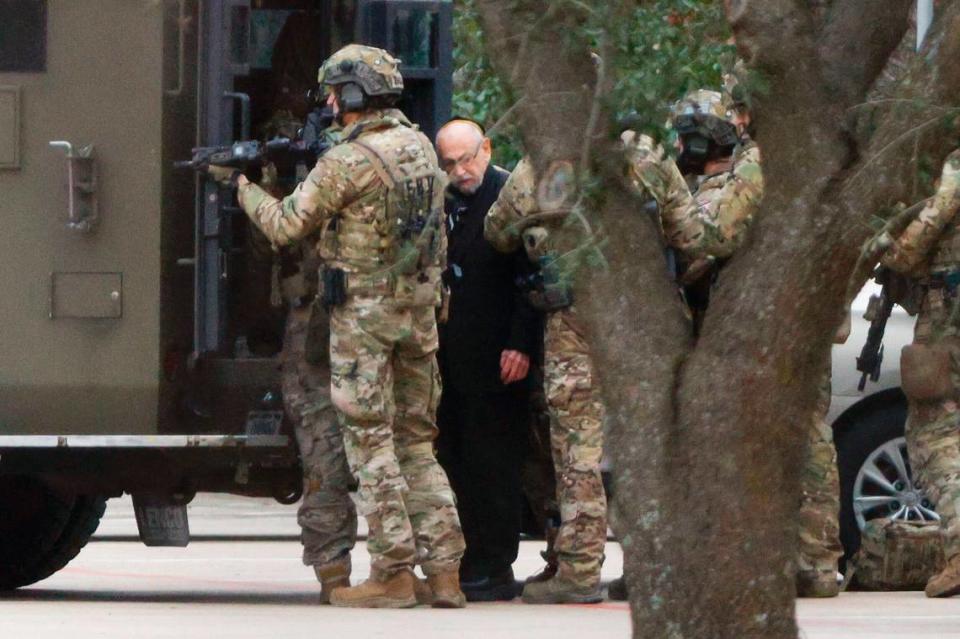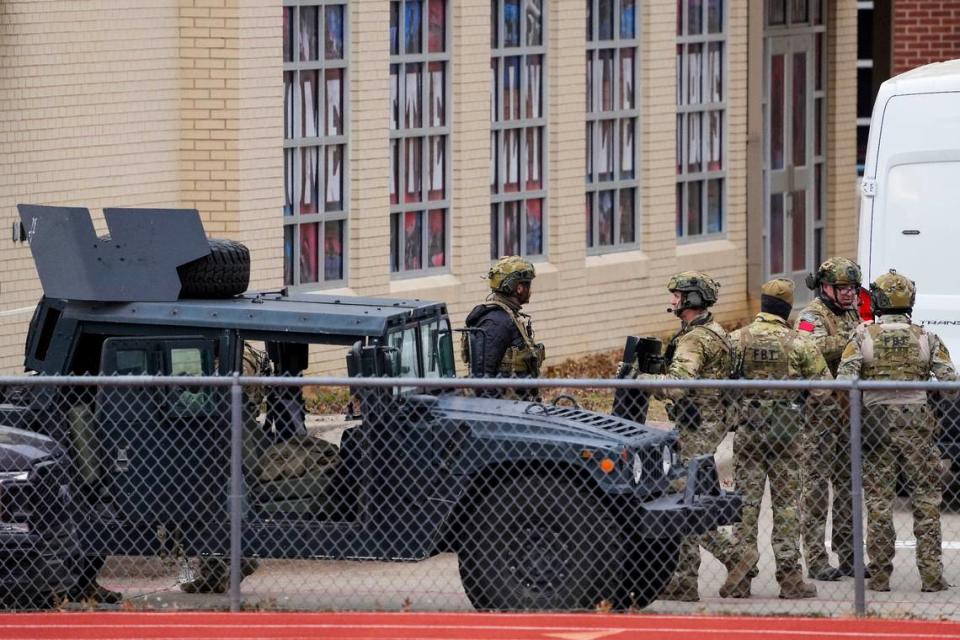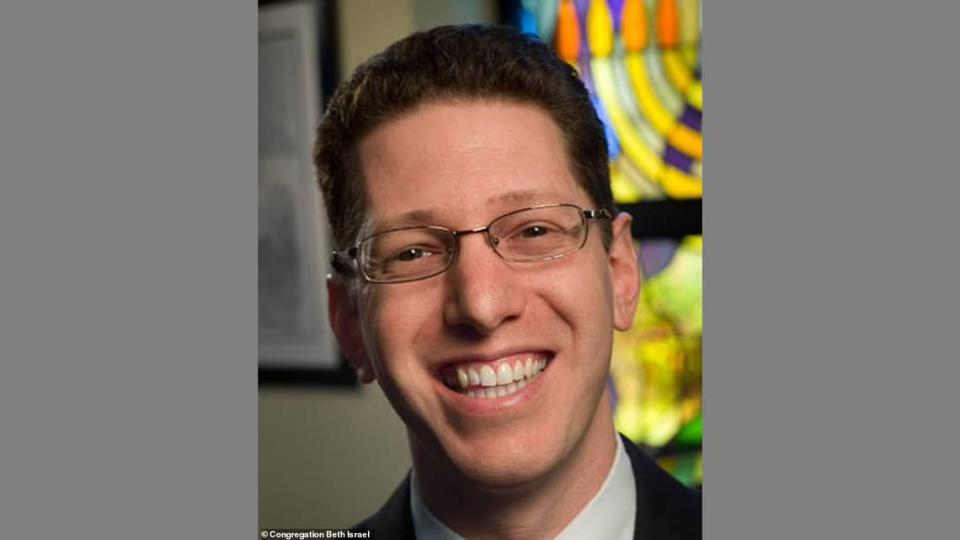‘TERROR at my synagogue’: Inside the 11-hour hostage standoff at Colleyville Beth Israel
On the morning of Jan. 7, Rabbi Charlie Cytron-Walker published his Friday message on Congregation Beth Israel’s website.
“We are living through a challenging time,” the 46-year-old rabbi told his congregation in Colleyville. “ It’s been stressful. Sometimes, it’s been overwhelming. We don’t always know how to cope; we don’t always know the right thing to do.
“There’s a lot of fear, and there’s a lot of uncertainty.”
Eight days later, he and three members of his congregation faced unimaginable fear and uncertainty in a terrifying, 11-hour ordeal that the world watched unfold in horror. It happened within their own small synagogue’s walls, after they welcomed a stranger into their house of worship.
What began as ordinary services on a blustery holiday weekend in suburban Fort Worth turned into what federal authorities describe as an act of terror, committed by a British man who traveled thousands of miles to unleash a long-simmering anger related to 9/11. By 9:30 p.m., all four hostages would escape unharmed, and the man would be dead inside the synagogue, thanks to smart thinking by the hostages and roughly 200 local, state and federal law enforcement officers who swarmed the site.
“Prayers answered,” Gov. Greg Abbott would tweet as news broke that the crisis was over. “All hostages are out alive and safe.”
But the trauma from Saturday’s events, which reverberated across the country from yet another act of violence against a Jewish community, isn’t likely to be over any time soon.
Hostage crisis plays out on Facebook live
Jeffrey Cohen arrived at the beige-bricked temple Saturday morning for Shabbat services. He, the rabbi and two other congregants were running the service and were the only ones in the building; most members watch services on Zoom or Facebook Live.
When Cohen walked in, Cytron-Walker pointed him to a guest. A stranger had knocked on the glass door of the synagogue that morning, and the rabbi let him in, thinking he needed shelter. Cytron-Walker made him a cup of tea, noting that some of his story did not seem to add up, but not imagining he could ever be a threat, he recounted Monday on “CBS Mornings.”
Cohen walked over and introduced himself to the man, now known to be 44-year-old Malik Faisal Akram, a British national. Akram was on the phone but stopped his conversation briefly and said hello to Cohen.
“There are certain tings you look at to size someone up,” Cohen told the Star-Telegram. “We got this from the active shooter course and the things to look at are their eyes darting around, are they sweating profusely, are their hands a little shaky. But he made eye contact, he was smiling, he was jovial, he said hello.”
The service started at 10 a.m., as usual. After the Amidah — the central prayer of the Jewish liturgy — Cohen heard “that unmistakable sound of an automatic slide engaging a round.”
“But it was out of place and the building makes many strange sounds,” Cohen said. “Rabbi Charlie heard it, too, and looked over at our guest. Within a moment, he was yelling something (but that wasn’t important).”
Cohen, who said he keeps his phone next to him during services, dialed 911 quickly and turned the phone screen down on the chair. Cohen and others at the synagogue — living in a world in which American Jewish people are no stranger to the threat of insidious attacks, even in houses of worship — had received training on what to do in case of their worst nightmare, which now seemed to be unfolding.
Based on that training, Cohen was already planning how he and others would escape. Akram ordered him to go to the back of the room. Cohen instead placed himself in line with one of the exits. That decision likely saved their lives.
Cohen’s call came in to police at 10:41 a.m. The situation quickly became clear: Someone was holding a rabbi and three people hostage inside the synagogue, and the entire situation was being broadcast live on the synagogue’s Facebook page.
The live stream, which only minutes before was filled with four voices reciting prayers, picked up the muffled sound of an angry stranger’s voice.
Congregation members watching from home would soon realize in horrifying disbelief what was happening, out of view of the live stream camera but captured by the microphone.
For a couple hours, the man ranted and yelled, then would sound cordial and calm. Much of the live stream captured apparent negotiations with law enforcement, the one-sided conversation in which he made a singular demand: the release of Aafia Siddiqui, a Pakistani neuroscientist arrested after 9/11, from a federal prison in Fort Worth.
“I don’t want to (expletive) give you four (expletive) dead bodies. OK? I don’t want to,” the man could be heard saying on the phone at one point. “I’m not a sociopath. I have feelings, I have emotions. I’m human, I’m me.”
Between the chilling statements from the gunman, Cytron-Walker’s voice was heard as he tried to talk the situation through with Akram. At one point, more than 8,000 viewers were watching the live stream.
A Colleyville police officer arrived at the door minutes after his 911 call, Cohen said. Akram screamed at the officer and pointed his gun at him. The officer pulled back; Cohen said he could only see the officer’s arm through the front window.
Within 15 to 30 seconds, they heard sirens coming toward them. Quiet fell outside the synagogue. Inside, Akram started to yell. He screamed that he wanted to free his sister from prison and went on a tirade against Jewish people. Cohen said he yelled, “Jews control the world, Jews control the media, Jews control the banks.”
Not long after the initial 911 call, law enforcement began surrounding the synagogue. The North Tarrant Regional SWAT Team arrived as officers evacuated residents from nearby homes and set up a perimeter.
“Please avoid the area,” Colleyville police tweeted at 11:31 a.m., giving no immediate indication of the reason why.
But word would spread quickly online about what was happening.
FBI, hostage rescue team arrives
Control of the scene would soon be handed off to the FBI, including SWAT and a hostage rescue team from Virginia, an elite force whose sole mission is to negotiate and conduct hostage rescues. Some 60 to 70 agents rapidly deployed to the site.
The FBI negotiators were in touch with Akram throughout the day. FBI Special Agent in Charge Matthew DeSarno from the Dallas field office said the hostages’ survival was almost certainly due to that constant communication.
Reporters started to show up at a Catholic Church, a staging site about half a mile down the street from the synagogue. A resident, dressed in all black, stood nearby listening to the live stream, pacing the parking lot and asking for information. By nightfall, dozens of reporters had joined them, and national news networks were carrying live updates.
Inside the synagogue, Cohen made himself stay calm. He did not yell or raise his voice. Instead, he and the others kept Akram talking. At one point, Akram let them call their families, Cohen said.
“I basically said, ‘I’m here at the synagogue, there is a gunman. He claims to have a bomb, this may not end well, I love you. Remember me,’” he said. “It was a very, very short conversation because I wanted to make sure I got to talk to everybody.”
Cohen moved closer to the exit door and made sure he still had clear access to his escape.
Cytron-Walker stayed calm, too. He said his training as a rabbi and clergyman helped him do that.
“We talk a lot about the idea of being a calm, non anxious presence,” he said in the interview with “CBS Mornings.” “We do that in hospital rooms, we do that during the most difficult of individual moments and I did the best I could to do that throughout the standoff.”
Akram sounded irate at times in the livestream audio, but he also mentioned several times he did not want to kill any of the people he was holding hostage.
“I like Jeff and I like rabbi … I really bonded with them. I really like them … We’ve only been here for a couple hours but I can see they’re good guys. I can see they’re good guys,” he said, apparently talking on the phone with law enforcement.
At one point, Akram seemed to offer to let one of the hostages go if he could speak with Siddiqui. He mentioned the man’s blood sugar was dropping.
“You get my sister on the phone, I’ll let (him) out,” Akram said. “(He) is in a bad condition, his sugar levels are dropping.”
‘Alarms started to go off’
Across the country in Michigan, Halie Soifer was only peripherally aware that a hostage situation was going on in Texas on Saturday afternoon.
She did not realize the victims were inside a synagogue until she saw a tweet from CNN reporter Doug Dunbar at 1:02 p.m.: “A gunman is inside congregation Beth Israel temple in Colleyville, on the heels of Shabbat services. An unknown number of people are being held.”
“For the Jewish community, that was really when the alarms started to go off at that point,” said Soifer, the CEO of the Jewish Democratic Council of America. “I’m in Michigan, so knowing a (street) block in Colleyville, Texas, that did not connect. But once a reporter identified a synagogue, then we knew. This is the third time in three years this has happened, that a synagogue was under attack.”
At 1:52 p.m., Akram could be heard on the live stream talking to someone on the phone, possibly a family member. In a Facebook post that was later taken down, Akram’s brother said Sunday that the FBI put the family in contact with him during negotiations.
“I’m going to die. Don’t cry about me,” Akram repeated over and over. “Are you listening? I am going to die.”
Negotiators tried to talk through the situation with Akram and persuade him to release the hostages. But Akram seemed more agitated as negotiators talked with him, continuing to demand he speak with Siddiqui.
“There’s something wrong with this (expletive) system,” he said in the live stream. “Maybe I’m losing my marbles … I’m trying to play ball with you right? But you’re not giving me nothing to work with.”
At 1:54 p.m., the live stream ended. Facebook later confirmed it took the video down.
For those following the developments, the uncertainty in the next several hours would be torture.
The founder of the synagogue, Anna Salton Eisen, posted on Facebook, and dozens of people reacted with prayers and shock. “I started this synagogue with two other families and am heartbroken and fearful,” Eisen wrote. “What has become of the world?”
At 2:43 p.m., Stacey Silverman, a member of Beth Israel, posted on her Facebook.
“TERROR at my synagogue,” she wrote.
At 2:20 p.m., Soifer got a text message that rocked her: The rabbi being held hostage was Cytron-Walker, a longtime friend she grew up with at the same synagogue in East Lansing, Michigan.
Soifer started gathering all the information she could to help Cytron-Walker’s family.
“Because putting myself in their shoes, I would not have wanted to receive information and updates from the press,” she said. ”So I tried to ensure that at least his sister would receive whatever information could be shared with the family.”
By that point, “Colleyville” was trending nationally on Twitter. America was watching the Fort Worth suburb where an international story was unfolding.
By then, the full weight of the federal government was mobilizing.
President Joe Biden was briefed and senior members of the national security team were put into touch with the FBI by at least 4 p.m., according to the White House. Livia Link, consul general of Israel to the Southwest, tweeted shortly after that she was on the way to Colleyville.
Plan of escape
Cohen continued to plan an escape. While rubbing one of the other hostages’ shoulders, he whispered in his ear to move closer to the exit door.
“What was going through my mind was, ‘what do we need to do to get out of here,’” he said.
Just after 5 p.m., one of the hostages was released.
Negotiators coordinated a pizza delivery for the remaining hostages, and at about 6 p.m., FBI agents were seen bringing water and pizza inside the synagogue. When the pizza was delivered, Cohen told Cytron-Walker to bring the food to same pew instead of the table.
“We were all within 20 feet of the exit door,” Cohen said in his post. “This proved critical for our escape.”
Nearby at Good Shepherd Catholic Community, residents and congregants gathered for a prayer vigil about 7 p.m. Reporters, tweeting with fingers numb from the cold, asked police for updates repeatedly. Officers responded only by saying when there was more information, they would let them know. Someone brought cupcakes and hot chocolate.
‘Grateful to be alive’
The hostages’ escape — planned delicately all day, through discreet steps toward the exit door and whispers to one another — would come quickly.
Things had begun to “devolve,” Cytron-Walker would later recount.
“He was screaming, ‘I am going to put a bullet on each one of you,’” Cohen said. “At that point, he was looking toward me. I looked him right in the eyes. I stared at him. I made my face very strict. And I think I shook my head, or I mouthed ‘no.’”
Akram backs down and goes to pour himself a soda. He might have set the gun down. Suddenly, Cytron-Walker throws a chair at Akram. The rabbi yells for them to run. Cohen sprints for the door, practically picking up the other hostage as he runs because he worries the man wouldn’t make it quickly enough. Cohen bursts through the exit door, Cytron-Walker right behind him.
As he runs, Cohen stumbles and hits the ground. He climbs into hedges nearby as he hears Akram at the door behind him.
A video taken by WFAA-TV’s Josh Stephen shows the moment the three escape. The video captures Akram, carrying what appears to be a handgun and wearing a backpack, briefly step out the door and return inside.
Dozens of agents in tactical gear surround the synagogue. A dog barks in the background. About 37 seconds after the gunman steps back inside, four gunshots are heard on the other side of the building. An explosion, more gunshots and officers’ shouts follow. A car alarm blares, and agents rush in a line to the side of the building where the gunshots are coming from. The hostage team breaches the synagogue.
Nearby reporters are told to hit the ground, Dallas Morning News reporter Jamie Landers tweets at 9:13 p.m. Fort Worth Star-Telegram reporter James Hartley tweets at the same time that he hears “what sounds like gunshots and a much louder bang, possibly a flash grenade.”
Akram is dead.
At 9:55 p.m., Colleyville police say the SWAT situation is resolved. At 10:15 p.m., law enforcement hold a news conference outside the Catholic church.
Surrounded by cameras, Colleyville Police Chief Michael Miller and FBI Special Agent DeSarno describe the efforts of the day.
DeSarno says the rescue of the hostages and the death of the hostage-taker “was a result of a long, long day of hard work by nearly 200 law enforcement officers from across this region.”
In the hours that follow, groups from around the world send messages of support to Beth Israel.
At 4:44 a.m. Sunday, Cytron-Walker posts on Facebook.
“I am grateful that we made it out,” he writes. “I am grateful to be alive.”





